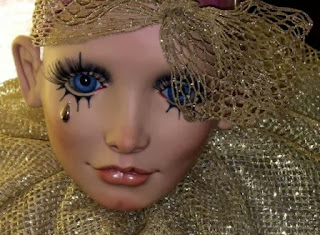Melody Moezzi is a bipolar Iranian-American Muslim born in Iran whose
academically and professionally distinguished family fled political turmoil
there and settled in the United States where they became citizens.
Now a lawyer in her thirties, Moezzi writes that in Iran
there is no recognition of bipolar disorder (or, as it was originally called,
manic depression), and so she has no way of knowing for sure of bipolar
relatives, although the disorder tends to run in families.
Because Muslims don't drink alcohol, however, Moezzi was
able to bypass the common mistake many bipolar people make of trying to
self-medicate by getting drunk. But beginning when she was fourteen, she did
have the familiar bipolar urge to kill herself, and it was her suicidal attempt
as an adult that led to her first legally mandated stay in a hospital psychiatric
ward. Even there, she was not correctly identified and medicated as bipolar but
instead was simply labeled as, and treated for, severe depression.
Throughout the nightmare of undiagnosed, untreated bipolar
disorder, Moezzi's husband supported and helped her. Her parents also did what
they could, although the concept of their daughter's mental illness was difficult
to grasp and accept despite that fact that the World Health Organization ranked
bipolar disorder as "the sixth leading cause of disability in the
world."
After 9-11, Moezzi admits that her bipolar "delusions,
hallucinations, melancholia, hair-pulling and nail-biting… have grown
significantly worse, leading to three separate psychiatric hospitalizations and
an ever-expanding personal pharmacy."
At least she is now correctly diagnosed as bipolar and is
grateful to have had Haldol prescribed, because it significantly relieves
bipolar symptoms. She takes other drugs as well and has spent some time in a
residential half-way house with an effective recovery program.
Her husband has become an expert in recognizing early
warning signs that bipolar mania is setting in. He gets her to a medical
facility quickly but he can't expect her to go meekly. Once, she insisted that
they had won the lottery and that he should quit his job so they could move to
Italy. He convinced her to stop at the hospital first.
On
another occasion, she protested so dramatically against hospitalization that she
and her husband ended up with a police escort making sure they got to the facility
that admitted her.
Her delusions have been extreme enough to land Moezzi in
five-point restraints while she screamed and struggled to free herself. An
ongoing fear is that that because her mania has transformed from "expansive,
grandiose and euphoric" to "restless, agitated and hostile," the
illness is getting worse. But as of the writing of the book, she had not had a
break with reality since she started taking Haldol.
Yet even now, she does not
always recognize and own up to the fact that she has a chronic mental illness,
which does not prevent her from being grateful finally to have found a
psychotherapist who meets her needs.
In addition to being a lawyer, Moezzi has become a journalist
and social activist on behalf of a free Iran. She also speaks up for people
with mental disorders, pointing out the lack of public sympathy
and support. No pastel, looped ribbons to
show support for the mentally ill.
Concluding her memoir on a note of hope and happiness, she
describes celebrating a traditional Muslim ceremony welcoming spring. A hyacinth
plant is key, and at first she can't find one. Then she and her husband go to
Trader Joe's, and TJ's comes through, selling her a beautiful lavender hyacinth
plant.



